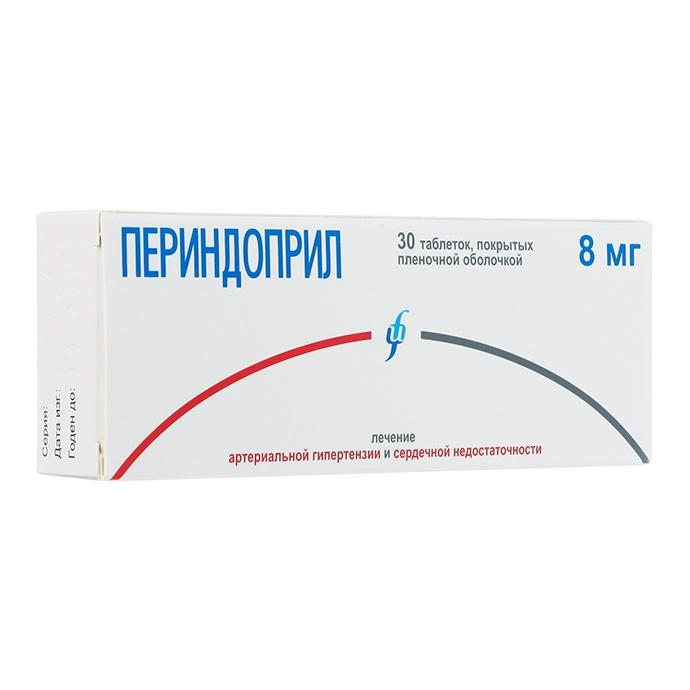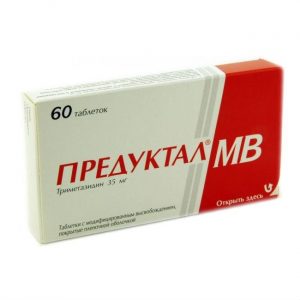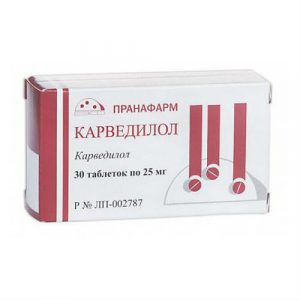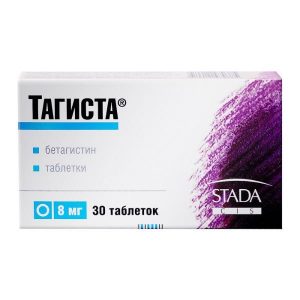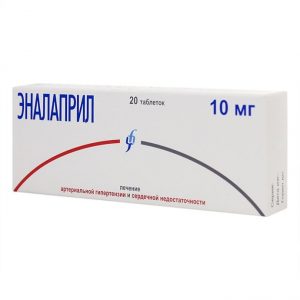Description
Pharmacological Action
ACE Inhibitor. It is a prodrug from which the active metabolite perindoprilat is formed in the body. It is believed that the mechanism of antihypertensive action is associated with competitive inhibition of ACE activity, which leads to a decrease in the rate of conversion of angiotensin I to angiotensin II, which is a powerful vasoconstrictor. As a result of a decrease in the concentration of angiotensin II, a secondary increase in plasma renin activity occurs due to the elimination of negative feedback during renin release and a direct decrease in aldosterone secretion. Due to its vasodilating effect, it reduces the OPSS (afterload), jamming pressure in the pulmonary capillaries (preload) and resistance in the pulmonary vessels increases cardiac output and exercise tolerance.
The antihypertensive effect develops during the first hour after taking perindopril, reaches a maximum at 4-8 hours and lasts for 24 hours.
Pharmacokinetics
After oral administration, perindopril is rapidly absorbed from the gastrointestinal tract. Cmax is reached after 1 h. Bioavailability is 65-70%.
In the process of metabolism, perindopril is biotransformed with the formation of an active metabolite – perindoprilat (about 20%) and 5 inactive compounds. Cmaxperindoprilat in plasma is reached between 3 and 5 hours after administration. The binding of perindoprilat to plasma proteins is insignificant (less than 30%) and depends on the concentration of the active substance. Vd of free perindoprilat is close to 0.2 l / kg.
Does not cumulate. Repeated administration does not lead to cumulation and T1 / 2 corresponds to the period of its activity.
When taken with food, perindopril metabolism slows down.
T1 / 2 of perindopril is 1 hour.
Perindoprilat is excreted by the kidneys of T1 / 2 of its free fraction is 3-5 hours.
In elderly patients, as well as in renal and heart failure, perindoprilat excretion is slowed down.
Indications
Arterial hypertension, chronic heart failure.
Contraindications
History of angioedema, pregnancy, lactation, childhood, hypersensitivity to perindopril.
Use during pregnancy and lactation
Perindopril is contraindicated in pregnancy and lactation (breastfeeding).
Application for impaired renal function
In case of impaired renal function, a dosage regimen correction is required depending on the QC values.
Use in children
Contraindicated in childhood.
Special instructions
Use with caution in case of renal failure and severe hypertension.
Before starting treatment with perindopril, a study of renal function is recommended for all patients.
During treatment with perindopril, you should regularly monitor kidney function, the activity of liver enzymes in the blood, perform peripheral blood tests (especially in patients with diffuse connective tissue diseases, in patients who receive immunosuppressive drugs, allopurinol). Before starting treatment, patients with sodium and fluid deficiency should be corrected for water-electrolyte disturbances.
During treatment with perindopril, hemodialysis using polyacrylonitrile membranes should not be carried out (the risk of anaphylactic reactions is increased).
Perindopril should be used with caution simultaneously with drugs that can cause an increase in the level of potassium in the blood (indomethacin, cyclosporine). Concomitant use with potassium-sparing diuretics and potassium preparations is not recommended.
Composition srdlp per.
Dosage and administration
Initial dose – 1-2 mg / day in 1 dose. Maintenance doses – 2-4 mg / day for congestive heart failure, 4 mg (less often – 8 mg) – for arterial hypertension in 1 dose.
In case of impaired renal function, a correction of the dosage regimen is required depending on the QC values.
Side effects
From the respiratory system: dry cough is possible.
From the digestive system: dyspeptic symptoms, dry mouth, taste disturbances.
From the side of the central nervous system: headache, sleep and / or mood disturbances, dizziness in some cases – convulsions.
From the hemopoietic system: lowering hemoglobin levels (especially at the beginning of treatment) rarely – a decrease in the number of red blood cells and / or platelets.
From the kidneys: a reversible increase in creatinine and uric acid levels.
Allergic reactions: angioedema, skin rash, itching, erythema.
Other: sexual disorders.
active substance
Perindopril
Terms of delivery from
pharmacies Prescription
dosage form
tablets
Izvarino Pharma, Russia
